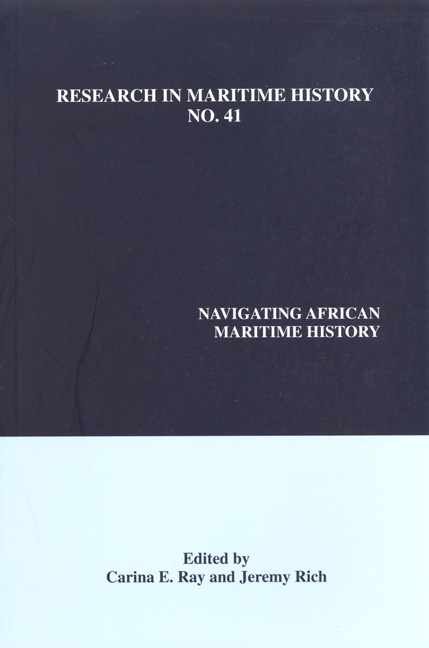Book contents
- Frontmatter
- Table of Contents
- About the Editors
- Contributors' Notes
- “Introduction: Charted Routes and New Directions in the Study of Africa's Maritime History”
- “Austronesian Mariners and Early Trans-Indian Ocean Crossings”
- “Eight Hens per Man per Day: Shipwreck Survivors and Pastoral Abundance in Southern Africa”
- “State Control and Regulation of Commerce on the Waterways and Coast of Senegambia, ca. 1500-1800”
- “Swimming, Surfing and Underwater Diving in Early Modern Atlantic Africa and the African Diaspora”
- “Rough Sailing: Risks and Opportunities for Immigrant African Maritime Workers in Gabon, ca. 1860-1914”
- “Desertion, Dereliction and Destitution: The Travails of Stranded West African Seamen in the United Kingdom, ca. 1921-1934”
- “‘The White Wife Problem:’ Sex, Race and the Contested Politics of Repatriation to Interwar British West Africa”
- “Sailing Beyond Apartheid: The Social and Political Impact of Seafaring on Coloured South African Sailors”
“Eight Hens per Man per Day: Shipwreck Survivors and Pastoral Abundance in Southern Africa”
- Frontmatter
- Table of Contents
- About the Editors
- Contributors' Notes
- “Introduction: Charted Routes and New Directions in the Study of Africa's Maritime History”
- “Austronesian Mariners and Early Trans-Indian Ocean Crossings”
- “Eight Hens per Man per Day: Shipwreck Survivors and Pastoral Abundance in Southern Africa”
- “State Control and Regulation of Commerce on the Waterways and Coast of Senegambia, ca. 1500-1800”
- “Swimming, Surfing and Underwater Diving in Early Modern Atlantic Africa and the African Diaspora”
- “Rough Sailing: Risks and Opportunities for Immigrant African Maritime Workers in Gabon, ca. 1860-1914”
- “Desertion, Dereliction and Destitution: The Travails of Stranded West African Seamen in the United Kingdom, ca. 1921-1934”
- “‘The White Wife Problem:’ Sex, Race and the Contested Politics of Repatriation to Interwar British West Africa”
- “Sailing Beyond Apartheid: The Social and Political Impact of Seafaring on Coloured South African Sailors”
Summary
A significant branch of maritime history is concerned with the history of shipwrecks, which often functions as an emblem of failure in the study of maritime enterprises. The shipwreck typically interests us for extra-maritime reasons, primarily because of events that unfold after the vessel is no longer at sea, after it has run aground, disintegrated or been forced ashore by leaks, the loss of mast or rudder, warfare or other calamities. Because the carreira da India, the trade route looping around southern Africa, generated fabulous riches for the purses of European kings and their high-ranking adventurers, the scramble for control of the shipping route and trading networks was characterized by voyages that were often recklessly planned, and the galleons that were pressed into service were often overloaded, inadequately outfitted or structurally unsound, particularly those returning to Portugal from India. These factors contributed to the record numbers of homeward-bound carracks and galleons wrecked along the stormy southern African coast in the sixteenth and seventeenth centuries. Charles Boxer and James Duffy, historians of the Portuguese maritime empire, consider that this dramatic upsurge in shipwrecks was directly tied to the lucrative trade with the Indies. But one unintended consequence of the many shipwrecks in southern Africa is the existence of a powerful corpus of shipwreck narratives, over five hundred pages from eleven accounts, which together give us the most accurate picture of life in coastal southern Africa during the era of first contact with Europeans in the sixteenth and early seventeenth centuries. Intended as cautionary tales and as the main sources of geographic and cultural information for subsequent mariners shipwrecked in southern Africa, they afford a rare glimpse of the economy, food production capabilities and herding practices of African inhabitants, much as the ordinary household objects or agricultural activities that appear in the backgrounds of Renaissance paintings give us unintended glimpses of another era's social and economic practices.
Luĩs de Camões’ epic poem, Os Lusiadas (The Lusiads), was written in the golden age of Portuguese maritime expansion and published in 1573. Its celebration of this era of exploration is threaded together by a number of historical events, most importantly those associated with Vasco da Gama's voyage around the southern African cape to India.
- Type
- Chapter
- Information
- Navigating African Maritime History , pp. 33 - 56Publisher: Liverpool University PressPrint publication year: 2009



